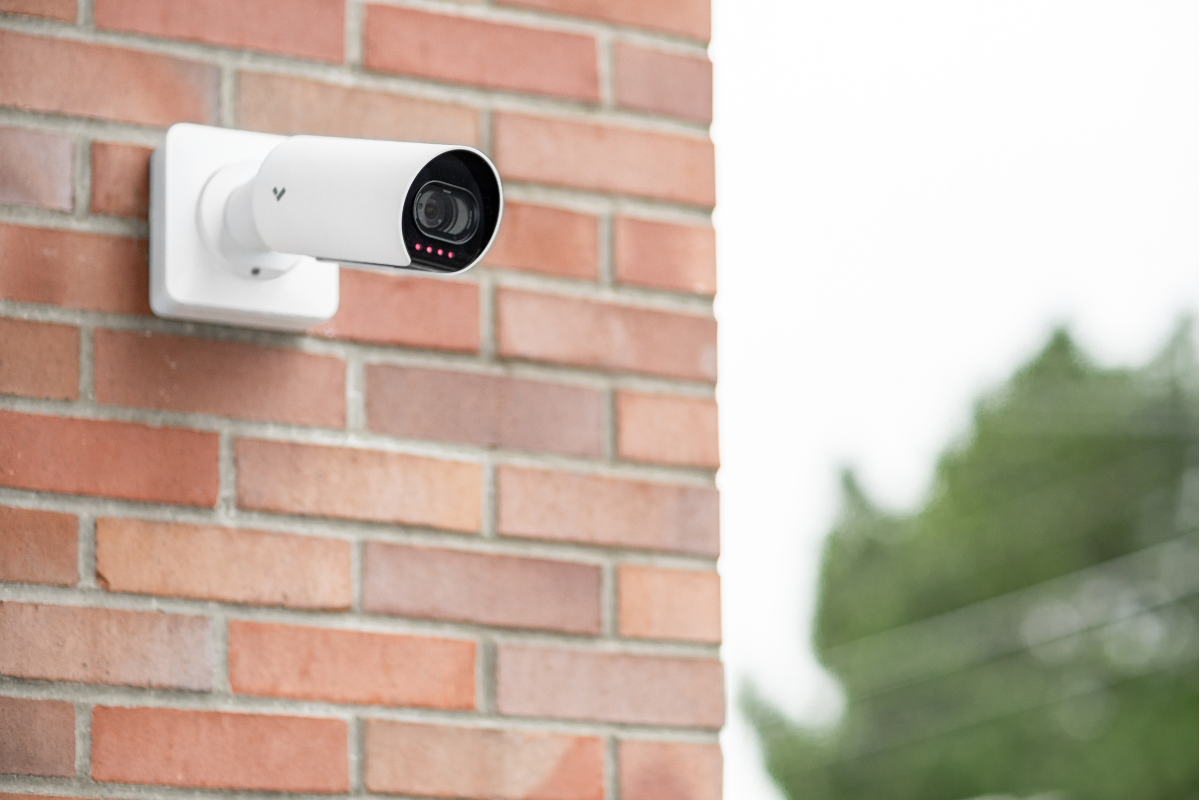In today's increasingly security-conscious world, security cameras are a popular way for businesses to protect and safeguard their workers and assets. However, many business owners are cautious about using video surveillance as the laws and policies surrounding the use of these cameras in the workplace can be difficult to understand and contradictory.
Is it legal to use security in the workplace? What restrictions and considerations should businesses look out for when building surveillance systems? How do these laws and policies differ from state to state?
In this complete guide, we'll provide you with a clear and easy-to-follow breakdown of office & workplace surveillance laws in the U.S. Let's go!
Can you legally install video surveillance cameras in offices?
The short answer is yes. While this varies from state to state, most US states allow employers to monitor employees' activities in the workplace without consent if there is a legitimate business reason for doing so - and where there is no reasonable expectation of privacy.
There are no specific federal laws that directly concern the use of video surveillance, but there is one that may be relevant, the Electronic Communications Privacy Act (1986).
The ECPA, commonly referred to as the ‘Wiretap federal law’, makes it illegal to record conversations of your workers without their consent. This means that without all-party consent, office surveillance should be silent - according to FindLaw.
However, generally, the ECPA does not outlaw video monitoring in the workplace. The National Workrights Institute says that federal law is only concerned with surveillance for “the most egregious invasions” and that general surveillance with a business purpose is generally permitted.
In the absence of specific federal laws on surveillance, the question of legality falls to the state level. What does state law say?
The General Overview of State Law on Surveillance
Some states have specific laws that address video surveillance in the workplace, while others do not. We’ll cover what the laws and policies look like in each state in a later section.
But what restrictions and factors are largely in play across the country? As we briefly touched on earlier, for an employer to monitor employees through video surveillance, there must be:
- A legitimate business reason for using video surveillance that outweighs the employee’s privacy interest.
- There must be no reasonable expectation of privacy on the part of employees in the location and circumstances of the surveillance.
That first point should be fairly straightforward to reach. Legitimate reasons could include security concerns, theft prevention, or improving productivity.
On that second point, video surveillance is not permitted in places where employees have a reasonable expectation of privacy, such as bathrooms, locker rooms, and sometimes personal offices. Moreover, it’s a general rule of thumb to not record break rooms or lounges.
However, some states do indeed have more stringent laws than others. For instance, Connecticut and Delaware require employers to notify employees about the presence of surveillance cameras.
Video Surveillance Laws State-by-State
Alabama
In Alabama, you can legally record video on your own private property unless there is a reasonable expectation of privacy - what Alabaman law defines as a “private place”.
For audio surveillance, Alabama is a one-party consent state. This means to record an audio conversation, you’ll need to gain the consent of at least one party in that conversation. Without gaining consent from your employees, you shouldn’t record the audio from your surveillance cameras.
Alaska
There are no specific laws that govern the use of security cameras in Alaska. The general rules of thumb covered above should apply - namely as long as there is no reasonable expectation of privacy, video surveillance on private property is legal.
Alaska is a one-party consent state in terms of recording conversations and communications.
Arizona
The use of video surveillance is legal in Arizona unless there is a reasonable expectation of privacy. Arizonan law defines this as “in a restroom, bathroom, locker room, bedroom or other location where the person has a reasonable expectation of privacy”.
There are no specific laws on surveillance in the workplace. Arizona is a one-party consent state and therefore state law dictates that you cannot “intercept communications unless you are a party or present during the conversation”.
Arkansas
In Arkansas, there are no specific laws regarding workplace surveillance. Employers may film surveillance footage in the office unless there is a reasonable expectation of privacy - generally following federal law.
Arkansas is a one-party consent state - meaning that you must obtain the consent of at least one party for audio recordings of conversations.
California
California law permits video surveillance of employees unless there is a reasonable expectation of privacy. According to Polaris Law, California Penal Code §647 states that employers should not install security cameras in break rooms or off company premises.
Unlike many other states, California is an all-party consent state. That means that employers must gain the consent of all parties to record the audio of conversations and discussions.
Colorado
It is legal for employers in Colorado to film surveillance footage at the workplace unless there is a reasonable expectation of privacy.
As a one-party consent state, Colorado requires that at least one party consents to audio recordings of conversations and discussions.
Connecticut
Connecticut state law dictates that employers can record their employees without their consent if there is a legitimate business reason and unless there is a reasonable expectation of privacy.
However, employers must notify employees that there exist surveillance cameras on the premises. This is usually in advance written notice, such as an internal memo, in an employee handbook or in an employment contract. However, an employer does not need to provide notice if they reasonably believe that one or more employees are breaking the law or are creating a hostile work environment - and that surveillance may capture evidence of the incident.
Delaware
In Delaware, it is legal for employers to use video surveillance in the workplace unless there is a reasonable expectation of privacy. However, like Connecticut, Delaware state law requires employers to notify employees about any electronic surveillance.
This advance notice should either be in written or electronic form and it must be acknowledged by the employee in writing.
Delaware is a two-party consent state - which requires all parties consent to record both in-person conversations and electronic communications.
Florida
In Florida, there are no specific laws regarding workplace surveillance. It is legal for employers in Florida to film surveillance footage at the workplace unless there is a reasonable expectation of privacy.
Employers may film surveillance footage in the office unless there is a reasonable expectation of privacy, generally following federal law. Florida is a two-party consent state, meaning that you must obtain the consent of all parties involved in audio recordings of conversations.
Georgia
In Georgia, it is legal for employers to use video surveillance in offices to record employees - unless there is a reasonable expectation of privacy. The federal law ‘rule of thumb’ is followed here, and employers shouldn’t put cameras in restrooms or locker rooms.
Georgia is a one-party consent state, meaning that you must obtain the consent of at least one party for audio recordings of conversations.
Hawaii
Under Hawaiian state law, employers can use video surveillance cameras to record employees without their consent, unless there is a reasonable expectation of privacy.
Hawaii follows the one-party consent rule for audio recordings, requiring the consent of at least one party during conversations. Therefore, according to XpertHR, may not make “audio recordings without prior written consent from the employees involved in the recording”.
Idaho
In Idaho, there are no specific laws regarding workplace surveillance. Employers may film surveillance footage in the office unless there is a reasonable expectation of privacy, generally following federal law. Idaho is a one-party consent state, meaning that you must obtain the consent of at least one party for audio recordings of conversations.
Illinois
Illinois state law permits employers to use video surveillance in the workplace if there is a legitimate business purpose unless there is a reasonable expectation of privacy. Employers are required to identify and make this purpose - such as ensuring productivity or protecting assets - clear.
Furthermore, any footage recorded by surveillance cameras can only be used for security purposes and may not be released without the consent of all parties in the recording.
For audio recordings, Illinois is a two-party consent state, meaning that you must obtain the consent of all parties involved in recordings of conversations.
Indiana
In Indiana, employers can film surveillance footage in the office unless there is a reasonable expectation of privacy. However, areas under surveillance that can only be accessed by employees (i.e. offices) must display a notice clearly stating that the area is under surveillance.
Indiana follows the one-party consent rule for audio recordings, requiring the consent of at least one party present during conversations.
Iowa
In Iowa, there are no specific laws regarding workplace surveillance. Employers may film surveillance footage in the office unless there is a reasonable expectation of privacy, generally following federal law.
Iowa is a one-party consent state, meaning that you must obtain the consent of at least one party for audio recordings of conversations.
Kansas
In Kansas, there are no specific laws regarding workplace surveillance. Employers may film surveillance footage in the office unless there is a reasonable expectation of privacy, generally following federal law. Kansas is considered a one-party consent state, requiring the consent of at least one party present during recorded communications.
Kentucky
Surveillance footage in the workplace is permitted in Kentucky unless there is a reasonable expectation of privacy as there are no specific laws governing workplace surveillance.
The one-party consent rule applies in Kentucky meaning consent of at least one party is required during conversations.
Louisiana
Louisiana does not have any specific laws regarding workplace surveillance. Employers are permitted to have surveillance cameras in the office, except in areas where there is a reasonable expectation of privacy. Louisiana follows the one-party consent rule for audio recordings meaning at least one person taking part in the conversation must consent to the recording.
Maine
In Maine, there are specific laws in place regarding the use of surveillance in the workplace. Employers may use surveillance only if it is strictly necessary to ensure employee health and safety or the security of employer data and:
- It is the least invasive means to accomplish this
- It is limited to the smallest number of employees possible and collects the minimum amount of employee data necessary
- The employer surveillance is conducted only after the employees have been notified
- The employee data collected is accessed only by authorised agents.
Maine follows the one-party consent rule meaning at least one party must consent to the recording of the conversation, apart from in places like dressing rooms or bathrooms where two-party consent applies.
Maryland
Maryland does not have specific laws on video surveillance in the workplace. Employers may have surveillance in the workplace, except in areas where there is a reasonable expectation of privacy.
Maryland is a two-party consent state meaning that audio cannot be recorded without the express consent of all parties in a conversation.
In addition, Maryland employers may not use facial recognition cameras during job interviews without written, signed consent from candidates.
Massachusetts
Specific laws apply to video surveillance in Massachusetts. Cameras must be documented and can only be present for legitimate business reasons (health, safety, theft prevention, workplace productivity, and security).
They should also be visible, clearly signed, and employees should be notified of their presence before installing/hiring. Surveillance is not permitted in areas with a reasonable expectation of privacy. Massachusetts also follows the two-party consent rule meaning all parties must consent before recordings of any conversation can be taken.
Nevada
In Nevada, it is legal for employers to use video surveillance in the workplace as long as there is a legitimate business purpose.
As is the case with federal law, employers can't install security cameras in areas where there is a reasonable expectation of privacy.
Nevada is a two-party consent state, meaning that you must obtain the consent of all parties involved in audio recordings of conversations.
Michigan
Employers in Michigan are permitted to use video surveillance in offices to record employees if there is a legitimate business purpose. In accordance with federal law, employers may not install surveillance in areas where there is an expectation of privacy.
Michigan is a two-party consent state. Moreover, it has strict guidelines on "eavesdropping" recordings and requires that employers gain consent from all parties involved in audio recordings.
New Hampshire
In New Hampshire, there are no specific laws regarding workplace surveillance.
Employers may film surveillance footage in the office unless there is a reasonable expectation of privacy, generally following federal law.
New Hampshire follows the one-party consent rule for audio recordings, requiring the consent of at least one party during conversations.
New Jersey
In New Jersey, employers must adhere to specific laws regarding workplace surveillance. While they can film surveillance footage in the office, there are limitations and requirements to safeguard employee privacy.
New Jersey is a two-party consent state, meaning that you must obtain the consent of all parties involved in audio recordings of conversations.
Minnesota
In Minnesota, there are no specific laws on workplace surveillance. Employers are permitted to have surveillance cameras in the office, except in areas with a reasonable expectation of privacy. Minnesota follows the one-party consent rule meaning at least one party of a conversation must consent to its recording.
Mississippi
There are no specific laws in Mississippi regarding workplace surveillance. Surveillance cameras are permitted unless there is a reasonable expectation of privacy. The one party consent rule is followed in Mississippi meaning only one party present in a conversation must consent to it being recorded.
Missouri
Missouri follows general federal law and has no specific regulations around surveillance in the workplace. Employers are permitted to have surveillance cameras in the office, except in areas where there is a reasonable expectation of privacy. The one-party consent rule applies here meaning at least one party must consent to any recording of a conversation.
Montana
There are currently no specific laws regarding workplace surveillance in Montana. Employers may film surveillance footage in the office unless there is a reasonable expectation of privacy.
Montana follows the two-party consent rule meaning all parties must consent to any audio recordings of conversations.
However, SB 397, also known as the Facial Recognition for Government Use Act, is a proposed legislation aimed at amending existing laws concerning the use of facial recognition software by government agencies, including police departments. The proposed changes aim to regulate and restrict the use of facial recognition technology by government entities in Montana.
Facial recognition is a fairly unexplored area in state law, and for now, this bill only concerns government agencies. However, it may indicate a tightening of these laws in the future. Some modern surveillance system use facial recognition technology - and so these products shouldn’t be used in government buildings in Montana.
Nebraska
Nebraska does not have any specific laws relating to video surveillance in the workplace. Employers are permitted to film anywhere there is not a reasonable expectation of privacy. It is also a state which follows the one-party consent rule meaning at least one party of a conversation must consent to any recording.
New Mexico
Workplace surveillance in New Mexico does not need to adhere to any specific regulations. Employers are permitted to film anywhere there is not a reasonable expectation of privacy. In New Mexico, the one-party consent rule is in place meaning at least one party must consent to any audio recording of a conversation.
New York
Video recording is permitted in the workplace in New York, however, all cameras must be clearly visible and accompanied by surveillance notices which are consistently apparent to all.
Video surveillance is also not permitted in areas where there is a reasonable expectation of privacy. It is also a one-party consent state meaning at least one party in a conversation must consent to any audio recording of it.
Like Montana, there are some specific laws surrounding the use of facial recognition. New York state law prohibits the use of facial recognition technology in schools. Security cameras with this feature shouldn’t be used in New York schools.
North Carolina
North Carolina does not have any specific laws about workplace surveillance. Employers may record in the workplace except in areas where a reasonable expectation of privacy applies. It is a one-party consent state meaning at least one party needs to consent to the recording of a conversation.
North Dakota
There are no specific laws regarding workplace surveillance in North Dakota.
Employers may record in the workplace except in areas where a reasonable expectation of privacy applies.
North Dakota follows the one-party consent rule for audio recordings, requiring the consent of at least one person during conversations.
Ohio
In Ohio, businesses may use video surveillance in offices if there is not a reasonable expectation of privacy. Rule 3337-44-119 of the Ohio state code requires that all video surveillance should be “conducted in a professional, ethical and legal manner”.
Ohio is a one-party consent state, meaning that audio recordings require the consent of at least one party during conversations.
Oregon
As with federal law, employers in Oregon may install security cameras in the workplace if there is no reasonable expectation of privacy.
Oregon is both a one-party and all-party consent state - depending on the circumstances of the recording. For surveillance audio, the net result is the same: you must obtain the consent of all parties involved in audio recordings of conversations.
Pennsylvania
In Pennsylvania, employers can film surveillance footage in the office unless there is a reasonable expectation of privacy, as there are no specific laws governing workplace surveillance.
Pennsylvania follows the all-party consent rule for audio recordings, requiring the consent of all parties during conversations.
Rhode Island
There are no specific state laws in Rhode Island relating to the use of security cameras in the workplace. Therefore, employers may employ workplace surveillance given there is no reasonable expectation of privacy.
Rhode Island is a one-party consent state, meaning that you must obtain the consent of at least one party involved in audio recordings of conversations.
South Carolina
In South Carolina, there are also no specific laws regarding video workplace surveillance. Employers may film surveillance footage in the office unless there is a reasonable expectation of privacy, generally following federal law.
South Carolina follows the one-party consent rule for audio recordings, requiring the consent of at least one party during conversations.
South Dakota
Within South Dakota, workplace surveillance is not explicitly governed by state laws. Employers have the leeway to monitor their offices via video unless the privacy expectations of employees are violated, generally in line with federal laws.
As for audio conversations, South Dakota adheres to the one-party consent rule, thus a minimum of one participant's permission is required to record.
Tennessee
In Tennessee, it is entirely permissible to utilize surveillance video recording. However, it's important to note that Tenn. Code Ann. § 39‐ 13‐605 prohibits the recording of private areas, yours or anyone else's. Essentially, surveillance cameras can be installed in areas where no one expects privacy.
Moreover, Tennessee operates under the one-party consent rule, meaning for audio recording, consent from at least one party is needed. As a result, the recommended practice is to avoid recording audio when using surveillance cameras.
Texas
In Texas, employers may use video surveillance in the workplace but they are encouraged to provide notice to employees. The usual rule of prohibition in areas where there is a reasonable expectation of privacy applies here.
In the state of Texas, the recording of conversations operates under the "one-party consent" principle. According to the Texas Penal Code Sec. 16.02, it is illegal to deliberately intercept or covertly record any wire, oral, or electronic communication without the consent of at least one participant.
Utah
In Utah, employers can film surveillance footage in the office unless there is a reasonable expectation of privacy, as there are no specific laws governing workplace surveillance.
Utah follows the one-party consent rule for audio recordings, requiring the consent of at least one party during conversations.
Vermont
In Vermont, the absence of specific laws on workplace surveillance permits employers to utilize video surveillance in office spaces, barring any infringement on reasonable privacy expectations.
When it comes to audio recordings, Vermont abides by the one-party consent rule, thus a conversation can be recorded with the permission of at least one participant.
Virginia
In Virginia, employers may film surveillance footage in the office unless there is a reasonable expectation of privacy unless the surveillance would constitute or cause:
- unreasonable intrusion upon the employee’s seclusion, or solitude, or into his private affairs;
- public disclosure of true, embarrassing private facts about the employee;
- publicity which places the employee in a false light in the public eye; and
- misappropriation of an employee’s name or likeness for commercial purposes.
Furthermore, Virginia is a one-party consent state, meaning that you must obtain the consent of at least one party for audio recordings of conversations.
Washington
In Washington, employers can film surveillance footage in the office, but there must be a reasonable business reason to do so. There must also not be a reasonable expectation of privacy.
Washington is a two-party consent state, meaning that you must obtain the consent of all parties involved in audio recordings of conversations.
Like Montana, government agencies may also not use facial recognition, unless there is a warrant. Such cameras shouldn’t be used in government offices.
West Virginia
In West Virginia, there are no specific laws regarding workplace surveillance. Employers may film surveillance footage in the office unless there is a reasonable expectation of privacy, in accordance with federal law.
West Virginia follows the one-party consent rule for audio recordings, requiring the consent of at least one party during conversations.
Wisconsin
In Wisconsin, employers can film surveillance footage in the office unless there is a reasonable expectation of privacy, as there are no specific laws governing workplace surveillance.
For audio recordings, the state follows the one-party consent rule, meaning at least one participant's consent is required to record a conversation.
Wyoming
In Wyoming, there are no specific regulations regarding workplace surveillance. Employers can generally implement video surveillance within the office, except in spaces with a reasonable expectation of privacy, in keeping with federal guidelines.
As for audio conversations, Wyoming requires one-party consent, meaning consent from at least one involved party is necessary for recording.
Recap & Best Practices for Video Surveillance in the Workplace
The rules surrounding video surveillance in the workplace should be fairly reassuring to any employer looking to install security cameras in the office. There is a lack of specific laws and regulations in most states (and indeed, federally).
Here are some useful best practices to follow:
- You must not install cameras in areas where there is a reasonable expectation of privacy. The definition of this can vary from state to state depending on case law - but basic decency can apply here.
- It’s good practice to provide written notice to your employees if you’re planning on installing security cameras. They should know where it is and for what purpose it’s installed.
- Unless you get the written consent of everyone in your office, you should record audio from your security cameras. This is due to the federal wiretapping laws making this a dangerous area to tread.
Security cameras are a useful safety tool for workplaces to protect assets and keep employees safe. As long as you follow some simple rules and etiquette, the legal side of workplace surveillance should be fairly straightforward.
Note: The information provided in this article is for general informational purposes only and should not be considered as legal advice.
While efforts have been made to ensure the accuracy and reliability of the information, it is always recommended to consult with a qualified legal professional or relevant authorities for specific legal guidance and advice pertaining to your individual situation.











